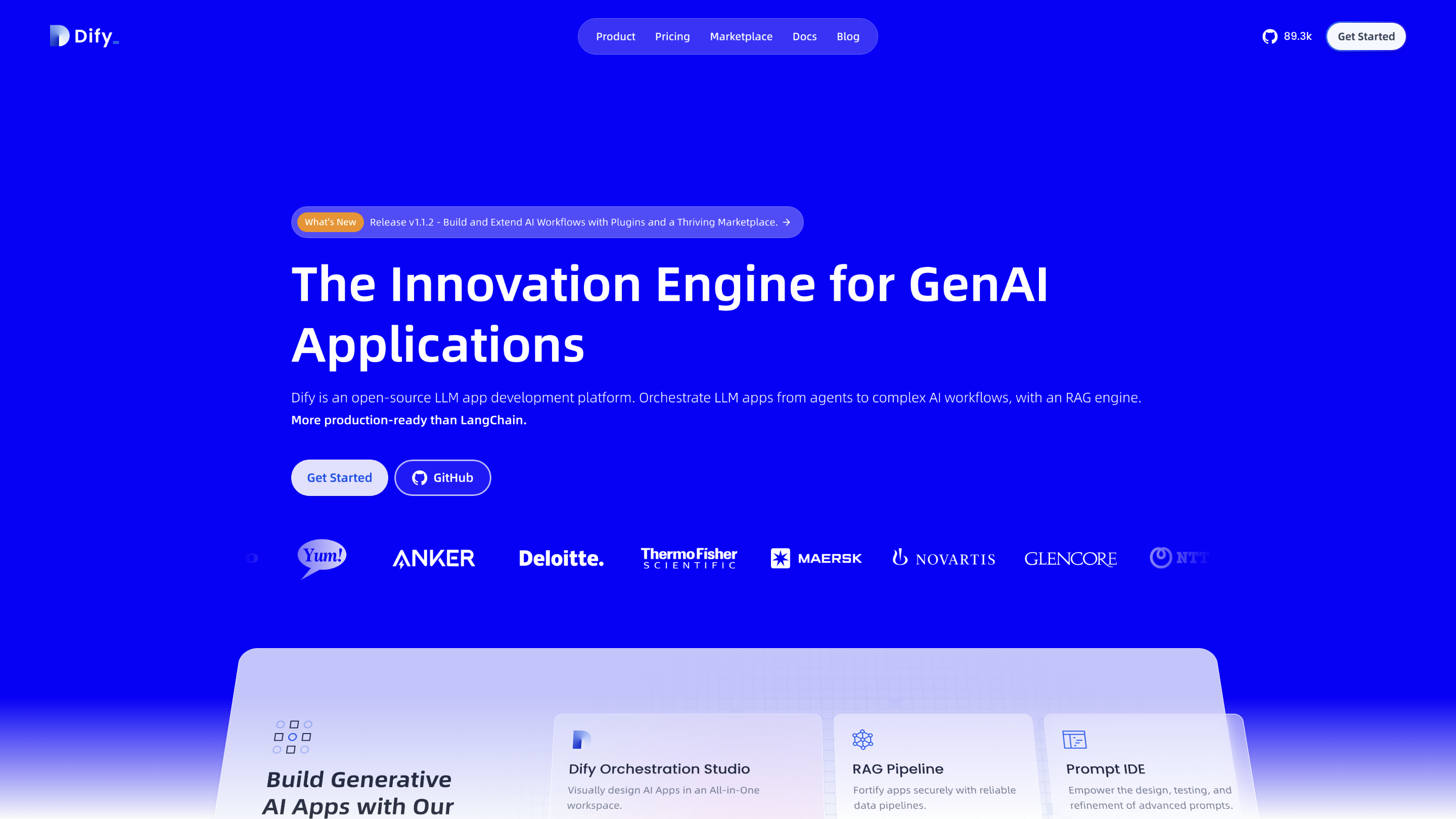Dify
Open siteCoding & Development
Introduction
Dify empowers users to create sustainable applications effortlessly.
Dify Product Information
Dify.ai is described as the Innovation Engine for Generative AI applications. It is an open-source platform designed to help developers build, orchestrate, and deploy AI-powered workflows and apps by managing agents, complex AI workflows, and retrieval-augmented generation (RAG) pipelines. Dify aims to be more production-ready than comparable frameworks and provides a variety of tools to streamline building GenAI solutions, including a visual orchestration studio, prompt design tooling, and enterprise-grade capabilities.
Overview
- Open-source LLM app development platform
- Orchestrates LLM apps from agents to complex AI workflows with an integrated RAG engine
- Marketed as more production-ready than LangChain
- Features tools for design, testing, and refining prompts; enterprise LLMOps; Backend as a Service (BaaS); and diverse deployment options
How It Works
- Use the Dify Orchestration Studio to visually design AI apps in a single workspace.
- Create and manage RAG pipelines to ensure data reliability and traceability.
- Develop prompts with the Prompt IDE to test and refine AI interactions.
- Build custom LLM Agents that independently use various tools and data to complete tasks.
- Optionally deploy as BaaS to expose backend APIs and integrate AI into existing products.
- Monitor, log, annotate, and fine-tune deployments with Enterprise LLMOps for governance and optimization.
Key Capabilities
- End-to-end AI workflows: Flexibly orchestrate AI processes, integrate with existing systems, and monitor runtime for reliable business deployment.
- LLM Agents: Create custom agents that independently utilize tools and data to solve complex tasks.
- RAG Pipeline: Fortify apps with reliable data pipelines for safer and more accurate results.
- Prompt IDE: Design, test, and refine advanced prompts.
- Backend as a Service (BaaS): Comprehensive backend APIs to integrate AI into products.
- Enterprise LLMOps: Monitor reasoning, log data, annotate, and tune models at scale.
- On-premise solutions: Achieve reliability, compliance, and data security within enterprise environments.
- Private Knowledge Base & AI Assistants: Securely leverage enterprise knowledge bases for intelligent search and Q&A.
- One Platform for Global LLMs: Flexible switching between models (e.g., OpenAI, Anthropic, Azure, and more) to fit evolving needs.
- Visual Design Studio: Dify Orchestration Studio provides an all-in-one workspace for building AI apps.
- Marketplace & Plugins: A thriving marketplace and plugins to extend functionality (as emphasized in release notes).
How to Use Dify.ai
- Start with the Dify Orchestration Studio to visually design AI apps.
- Define data flows with RAG pipelines to integrate external knowledge safely.
- Build LLM Agents that autonomously perform tasks using configured tools.
- Use the Prompt IDE to craft and validate prompts across scenarios.
- Deploy as a BaaS API layer to embed AI capabilities into products.
- Utilize Enterprise LLMOps for ongoing governance and optimization.
Safety and Governance Considerations
- Enterprise deployments emphasize reliability, data security, and compliance.
- Use On-premise options where sensitive data handling is required.
Core Features
- Open-source LLM app development platform
- Orchestrate LLM apps from agents to complex AI workflows with an integrated RAG engine
- Production-ready tooling with an emphasis on governance (LLMOps) and reliability
- Visual AI app design with Dify Orchestration Studio
- Prompt Design (Prompt IDE) for advanced prompt development
- LLM Agents that autonomously use tools and data
- RAG pipelines for robust data handling
- BaaS (Backend as a Service) to expose AI capabilities via APIs
- Enterprise-grade features: monitoring, logging, annotation, and fine-tuning
- On-premise deployment options for data security and compliance
- Private knowledge bases and AI assistants for enterprise search and Q&A
- Flexible multi-LLM support with easy model switching
- Plugin and marketplace ecosystem to extend capabilities
Ready to Get Started?
- Explore the Orchestration Studio to visually build your AI workflows.
- Configure agents and tools to address your business tasks.
- Deploy as a service and connect to your product with BaaS APIs.
- Continuously monitor and optimize with Enterprise LLMOps.
